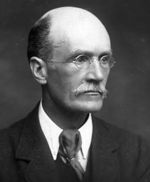It is Gilbert Murray’s thesis that in the period between 340 BC and 200 AD, the so-called Hellenistic Age, there was a ‘failure of nerve,' a retreat from the growth of human intellectual development.
In that period there is a change in the whole relation of people to the world about them. There “is a rise of mysticism, a loss of self-confidence, of hope in this life and of faith in normal human effort.” There is “a cry for infallible revelation.” The aim of the moral life changed from living justly and helping society to that of saving one’s soul.
The answer to the Big Question of human relationship to the universe changed from that where the value of human endeavor in this world was important, to that of concern for the soul and the world to come. In the period in between there was the attitude of ‘chance would have it’ or of ‘it was fated to be.’ When Babylonian astrology fell upon the Hellenistic mind, it landed some people in the actual worship of Fortune or of Fate. From there, the human spirit retreated into superstition and mysticism.
Murray says that the Great Unknown surrounds us on every side and we must have some relation towards it. That relation depends on the discipline of a person’s mind and the bias of character. Those who would avoid failure of nerve should follow knowledge and conscious reason as far as they will go. When they fail, as they will, “we must use as best we can those fainter powers of apprehension and surmise and sensitiveness by which, after all, most high truth has been reached as well as most high art and poetry: careful always really to seek for truth and not for our own emotional satisfaction, careful not to neglect the real needs of men and women through basing our life on dreams; and remembering above all to walk gently in a world where the lights are dim and the very stars wander.”


